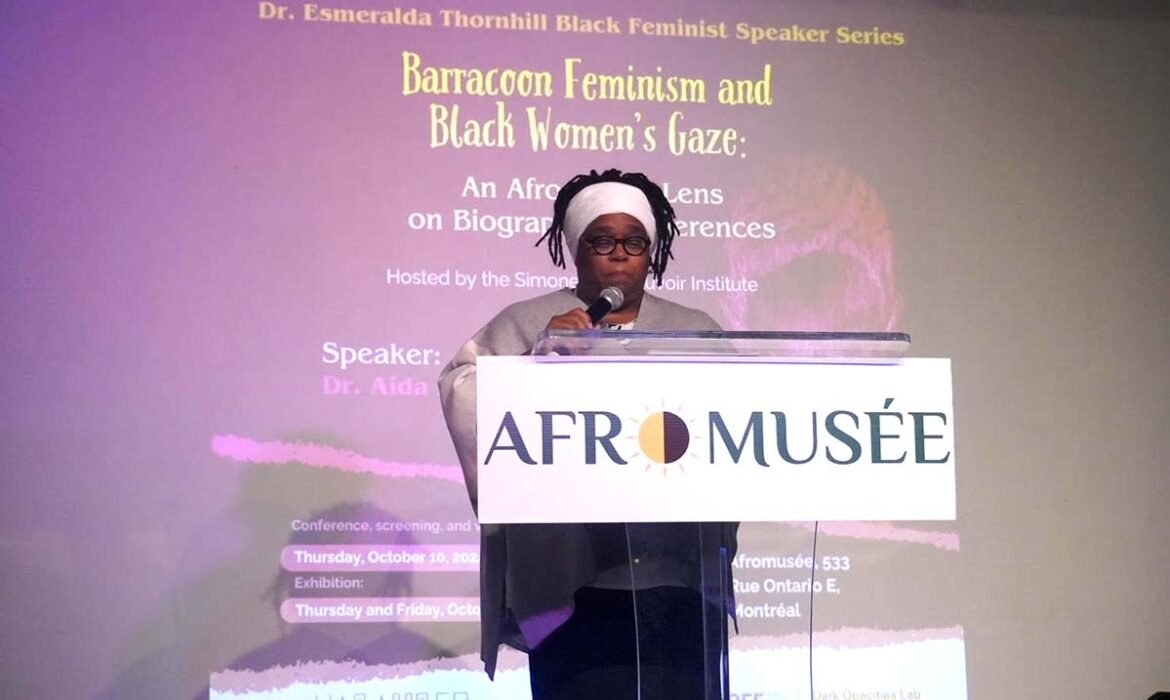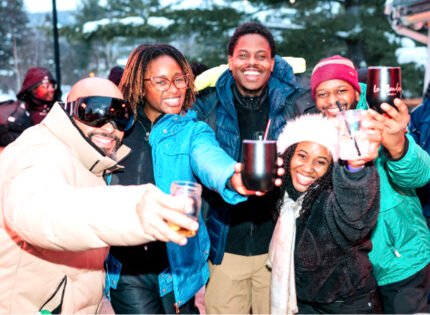Esmeralda M.A. Thornhill
Launched in October 2023, the Dr. Esmeralda Thornhill Black Feminist Speaker Series each year brings to the Simone de Beauvoir Institute, to Concordia University, and to Montreal, Black scholars, researchers, artists, Community organizers, and/or Agents of Change whose work on Black feminism centers, theorizes, and problematizes Black Women’s reality. Last October 10, 2024, this Black Feminist Speaker Series welcomed to its platform the first invited speaker – professor, anthropologist and filmmaker, Dr. Aida Esther Bueno Sarduy, who delivered a mind-gripping presentation that kept a packed audience riveted in rapt attention at Montreal’s Afromusée venue.
Speaking to her selected title, Barracoon Feminism and Black Women’s Gaze, Dr. Bueno Sarduy captivated her listeners as she shared parts of her ongoing research which uses audio-visual tools to focus on the struggles of Black Women. More specifically, as illustrative complements to her lecture, the audience had the privilege of screening both her nine-minute short film, Guillermina, and the trailers for her other two cinematic productions – a six-minute short film, Joaquina de Angola, and Ana de Borges, a full-length feature film currently in production.
In Guillermina, a series of drawings, sketched figures in simple lines, serve to bring to life the memories of a 40-year old Cuban White man whose over voice sentimentally reminisces, evoking his memories of a happy childhood spent cocooned in the loving affection of his Black nanny named “Guillermina” – but he admits that to this day he knows nothing of this much beloved Significant Other …including her fate.
Then follows a succession of archival formal photographs that capture Black nannies or nurses holding or watching over White babies, infants, toddlers on their laps, or in prams. This picture gallery freeze-frames for posterity their Black-Woman-gaze – facial expressions with deep knowing eyes … non-verbal, yet so telling! Black Women, unknown, unnamed, relegated to the background, side-lined to the edge, dismissed in the corner, serving as foils, utilitarian fixtures, objects obeying on command – seen yet unseen, visible yet invisible.
This nine-minute film was eye-opening if not jolting to some, for it compelled us to start questioning the one-sided history that we as a society have traditionally embraced and accepted. Guillermina also forces us as Peoples of African Descent to acknowledge the ways in which, because of history’s biases and omissions, our current “historical consciousness” is a falsified one that we must resolutely re-examine, problematize, and correct – just one of the multiple “Barracoon Feminism” lessons that a number of us have taken away.
For myself and Black Women like me:
“Barracoon Feminism” comes heavily freighted with the weight of our obfuscated history. “Barracoon Feminism”immediately teleports me back to the barracoons or slave barracks – slave quarters or holding places of confinement that still awaken and trigger so many “plantation memories” which surge up to flood and engulf me… memories of our Black-Woman-bodies objectified – by White men, White women and White children– our bodies politicized, commodified, monetized, and capitalized as units of labour, ripe and ever-ready for exploitation and hard, backbreaking, ‘from-sunup-to-sundown’-work – field work, house work, caregiver work, reproductive work, forced sex work –in short, objects… chattel to be used, mis-used and abused.”
For us Black Women, Dr. Sarduy’s phrase “Barracoon Feminism” is a meaningful and fittingly coined term that reflects with authenticity our past and present lived experience and reality, even as it honours our Black-Woman-perspective.












